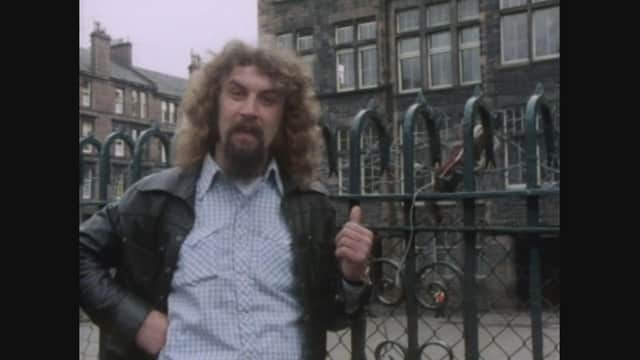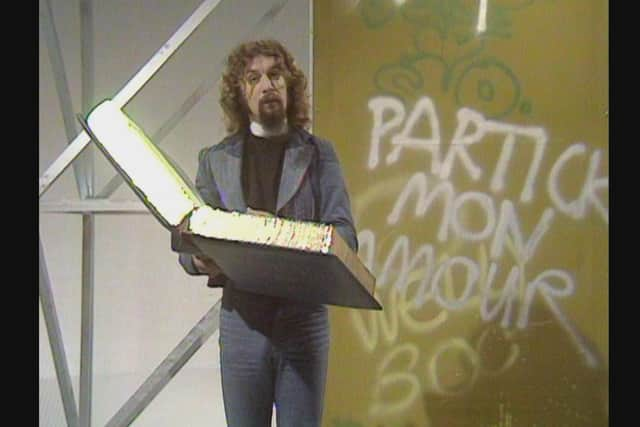Billy Connolly: Scourge of sectarianism in Scotland is being kept alive by social media


The Glasgow comic, who has poked fun at sectarianism since he burst into the limelight in the early-1970s, said sectarian hatred seemed louder than ever in modern-day Scotland and – even though he felt it was “less potent and fewer people are hurt”.
Speaking in a new BBC Scotland documentary series, Connolly admits he has had a “lifelong love affair” with sending up organised religion and had found to be “a goldmine for comedy”.
Advertisement
Hide AdAdvertisement
Hide AdRecalling run-ins with church leaders like Pastor Jack Glass in the 1970s, Connolly – who admitted his routine relocating The Last Supper and The Crucifixion to Glasgow was “the making” of him – said it was “appalling” he was continually asked to apologise for mocking religion, adding: “There’s something quite fascist about it.”
Connolly, who had a Catholic education in Glasgow, said there was a “weirdness” about religious bigotry in Scotland which could be traced to the arrival of Irish immigrants during the 19th century potato famine.
The 77-year-old added: “They were poor, bare-foot people. They came and they were looked on as a lower side of life. They moved into the slums and gradually worked their way up from there. It has never left them. They were always looked on as second-rate, second-class people.”
The latest episode of the documentary, Billy and Us, which will be shown tomorrow, features archive footage of the comic attacking the “pathetic” sight of parades heading through the streets of his native Glasgow and how he learned “bigotry at first hand” after being separated from his friends when he started school.
Connolly said: “The tail of that beast keeps wagging. It is louder than it used to be. But it is less potent. Fewer people are hurt than there used to be. If you look at the membership of those societies, they are all falling, they are all tumbling. But social media makes it look alive.


“It is one of the crimes of social media. It makes fanaticism look alive when it is just a guy in his underpants in his mother’s cellar. The modern age can’t tolerate that kind of thing.”
In the documentary, Connolly said he had found it “extraordinary” that religion and politics were considered taboo topics for comics when he first started performing stand-up in the 1970s.
Advertisement
Hide AdAdvertisement
Hide AdHe added: “I have offended most religions. I didn’t set out to do that but they take offence so easily. All you’ve got to do is talk about them and what they do and they’ll find offence in it. It’s because they know they’re a bit ridiculous. But I don’t mind being attacked by them.
“The difference between me and the comedians with blue mohair suits was they were happy to do racist, homophobic [material]. That was the way of it. That’s what was considered funny. You didn’t speak about religion or politics. It was considered bad manners to talk about them in public, which is extraordinary.
“I knew it was having a profound effect on my audiences. They were roaring with laughter. I didn’t think they were going to tear down churches or set fire to them. I knew they were falling about laughing. That’s all I ever wanted.”
A message from the Editor:
Thank you for reading this story on our website. While I have your attention, I also have an important request to make of you.
With the coronavirus lockdown having a major impact on many of our advertisers - and consequently the revenue we receive - we are more reliant than ever on you taking out a digital subscription.
Subscribe to scotsman.com and enjoy unlimited access to Scottish news and information online and on our app. With a digital subscription, you can read more than 5 articles, see fewer ads, enjoy faster load times, and get access to exclusive newsletters and content. Visit www.scotsman.com/subscriptions now to sign up.
Our journalism costs money and we rely on advertising, print and digital revenues to help to support them. By supporting us, we are able to support you in providing trusted, fact-checked content for this website.
Joy Yates
Editorial Director
Comments
Want to join the conversation? Please or to comment on this article.